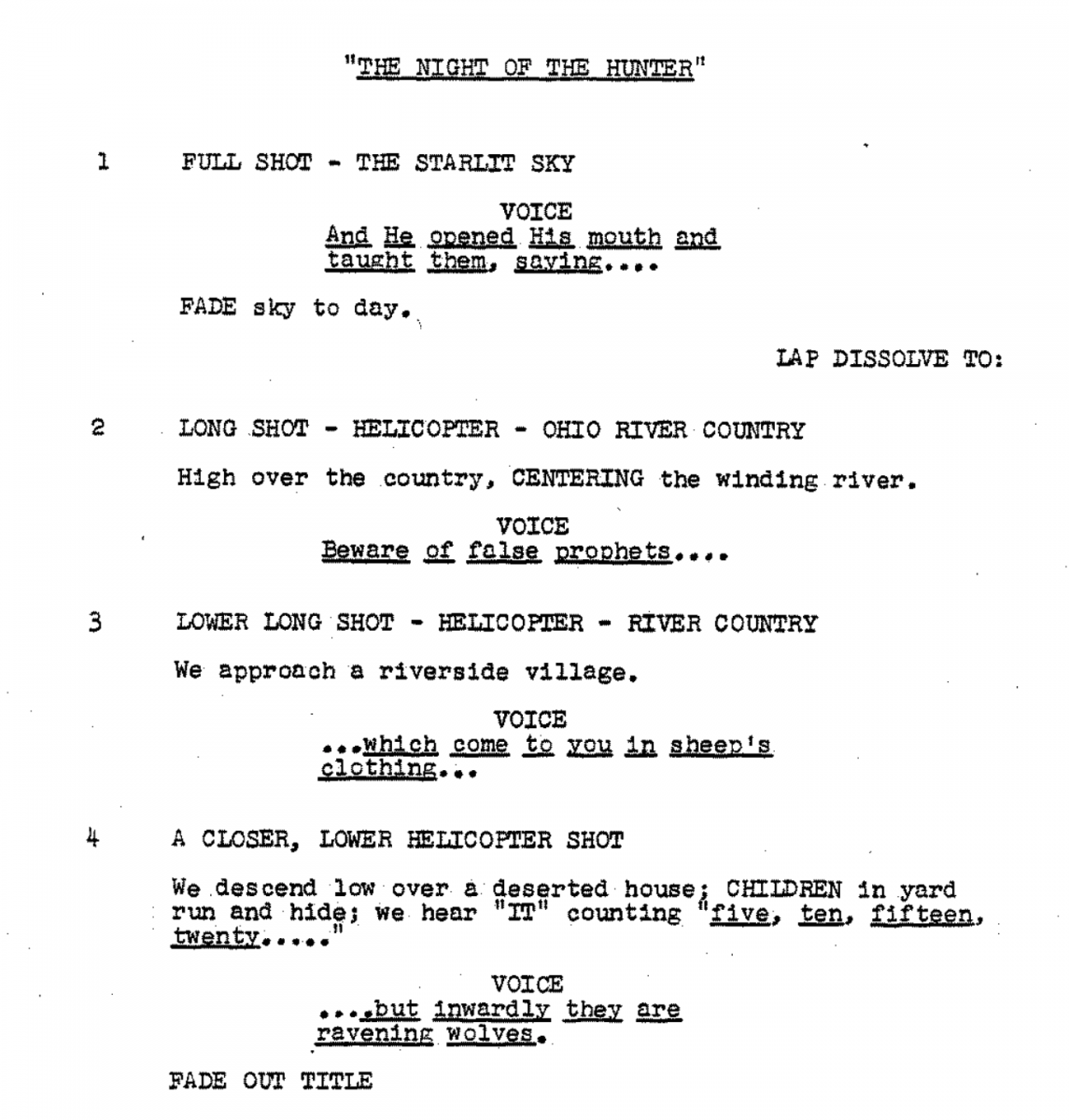EN
“There are things you do hate, Lord. Perfume-smellin’ things, lacy things, things with curly hair.”
Reverend Harry Powell
“Whenever The Night of the Hunter gets near water, its poetic heart truly palpitates. Two of its many bold, unforgettable images take place deep within or atop water: the dead body of Willa (Shelley Winters) underwater, her hair streaming, “being kissed by the fishes” as a song by John Cale and Bob Neuwirth evokes it; and the protracted passage of two children, John (Billy Chapin) and Pearl (Sally Jane Bruce), down river in a boat, watched over by an array of wildlife in close-up. Not the least remarkable thing about these watery assemblages is their way of melding realistic detail with the absolute artifice of sets, back-projected screens, carefully stage-managed inserts, and so on. At the height of the down-river sequence we pass in a cut from (as Isabelle Jordan noted in a 1982 Positif) documentary views of nature caught by a second-unit team to the obvious, indeed flagrant expressionism of a minimally dressed studio. And it is precisely at that usually forbidden intersection of natural and artificial worlds that the sui generis surrealism of The Night of the Hunter is born.”
Adrian Martin
“The Night of the Hunter contains more singing than some musicals, covering nursery rhymes, religious chants, folk tunes and a haunting song of loss (‘Pretty Fly’) for little Pearl. Ultimately, it is as if the very fabric of the surreal universe created by Laughton is woven in and through the magical effects and properties of singing – especially when we reach the unlikely duet of Rachel and Powell, during their tense nocturnal stand-off, harmonising to “Leaning on the Everlasting Arms” – one of the most disquieting and wondrous scenes in all cinema. Vocalising also takes another, completely contrary direction in the film – towards guttural, animal-like noise, devoid of language. The best sign of how far Mitchum was willing to go for Laughton is not his celebrated moments of physical slapstick, but his readiness to howl, yelp and emit childlike noises from somewhere deep inside his body.”
Adrian Martin
“Every actor worth his salt must create the character he plays out of his mind, his perceptions, his experience - otherwise he is not an actor at all. Great acting is like painting. In the great masters of fine art one can see and recognise the small gesture of a finger, the turn of a head, the vitriolic stare, the glazed eye, the pompous mouth, the back bending under a fearful load. In every swerve and stroke of a painter's brush, there is an abundance of life. Great artists reveal the god in man; and every character an actor plays must be this sort of creation. Not imitation - that is merely caricature - and any fool can be a mimic! But creation is a secret. The better - the truer - the creation, the more it will resemble a great painter’s immortal work.”
Charles Laughton
“If Laughton had had any doubts about wanting to direct on film, they were dissolved the moment he read The Night of the Hunter. He called Grubb as soon as he’d turned the last page and he said to him, ‘Man, who are your masters?’ […] it was no rhetorical gesture, no colourful praise. He wanted to know. The answer Davis Grubb gave to Laughton was quizzical: Howard Pyle, Hans Christian Andersen, Sax Rohmer. Of these three, Andersen is the most obvious: The Night of the Hunter was described by Laughton as 'a sort of Mother Goose tale' which, in an important sense, it is. The influence of the creator of Fu-Manchu is to be felt in Grubb's mastery of suspense and tenor. […]
An experienced screenwriter was needed. In the event, they chose one of the highest high-flyers of his day, James Agee, poet, novelist, film critic and scenarist of The African Queen, which he had written ten years before for John Huston. Some ten years older than Davis Grubb, his background was not dissimilar - he came from Knoxville, in Tennessee - and he had written, in Let Us Now Praise Famous Men, the definitive evocation of the rural Depression of the 30s, exactly the milieu of The Night of the Hunter. […]
Agee was an inspired choice. He had recently resolved to concentrate exclusively on his family background in his own writing, particularly his childhood: ‘Now as awareness of how much of life is lost, and how little is left, becomes even more piercing, I see! also, and ever the more urgently, the desire to restore, and to make a little less impermanent, such of my lost life as I can, beginning with the beginning and coming as far forward as need be. This is the simplest, most primitive of the desires which can move a writer.’”
Simon Callow

NL
“In de film The Night of the Hunter (Charles Laughton, 1955) zijn twee kinderen op de vlucht voor hun duistere stiefvader. Nu ze plotseling voortvluchtig zijn, slapen ze onder de sterren. Op een nacht ontdekken ze een verlaten hooischuur. Ze vinden beschutting tegen de spiedende blik van hun achtervolger en bovendien tegen de nacht die veel te groot is voor twee kleine kinderen. Terwijl broer en zus slapen in het hooi gebeurt er iets eigenaardigs. Naast de schuur, achter een struik plooit de hemel. De nacht golft als het zeil van een schip. Toen ik dit zag, voelde het alsof ik een kier in de werkelijkheid ontdekt had. De wereld van de kinderen op de vlucht is werkelijk. Tegelijk schemert er een andere realiteit in door. De film is gemaakt met licht en water, met uitgeknipte sterren en opgeprikte struiken. En buiten het kader stopt het decor. Daar waren mensen zojuist in de weer met lampen en kabels, maar nu houden ze allemaal hun adem in.”
Nina de Vroome